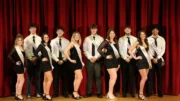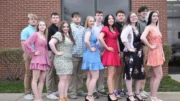OKLAHOMA CITY (AP) – Oklahoma and at least two other states said Friday that they have denied efforts by Russian officials to be present at polling stations during the election, requests the U.S. State Department’s spokesman dismissed as “nothing more than a PR stunt.”
The Oklahoma secretary of state’s office said it received a letter in August from Russia’s consulate general in Houston seeking to have one of its officers present at a voting precinct to study the “US experience in organization of voting process.” But the office denied the request, noting Oklahoma law prohibits anyone except election officials and voters from being present while voting is taking place.
Election officials in Louisiana and Texas said they denied similar requests from Russian officials.
Republican presidential nominee Donald Trump has faced criticism for suggesting the election might be “rigged,” and the U.S. earlier this month accused Russia of coordinating the theft and disclosure of emails from the Democratic National Committee and other institutions and individuals in the U.S. to influence the outcome of the election.
Thousands of hacked emails from accounts of individuals within Democratic nominee Hillary Clinton’s campaign have been posted on the website of the WikiLeaks organization. Russian officials have denied their involvement in the cyberattacks.
While there is a formal process for foreign governments to observe U.S. elections, individual states maintain the authority to approve or deny those requests, said State Department spokesman Mark Toner.
“Any suggestion that we rejected Russia’s proposal to observe our elections is false,” Toner said in a statement. “Individual parties – foreign governments, NGOs, etc. – are welcome to apply to state governments to observe our elections.”
Russia hasn’t participated in an international mission to observe elections, so its effort to do so on the state level represents “nothing more than a PR stunt,” Toner said.
White House Press Secretary Josh Earnest said the purpose of the requests was uncertain. He added it was “appropriate” that people might be suspicious of Russia’s motives.
“While it would be our honor to offer the opportunity to observe our voting process, it is prohibited under state law to allow anyone except election officials and voters in or around the area where voting takes place,” Oklahoma Secretary of State Chris Benge wrote in a response to Alexander Zakharov, Russia’s consul general in Houston.
Texas has similar prohibitions on entering polling places, and Louisiana Secretary of State Tom Schedler denied the request, citing that state’s catastrophic flooding in the Baton Rouge area in August.
Zakharov’s letter to state election officials was dated Sept. 24, but Oklahoma and Texas officials said they received it in late August.
Zakharov’s office did not return a message from The Associated Press inquiring about the discrepancy, and a request for comment from the Russian Embassy in Washington was not immediately answered.








































